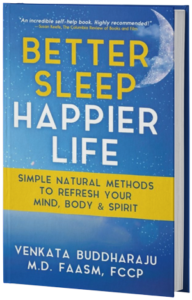By Venkata Buddharaju MD, FAASM, FCCP
Board Certified in Critical Care, Pulmonary & Sleep Medicine (ABIM)
www.drbuddha.com
Introduction
Over the course of my career, I have observed and studied the relationship between overall health, immunity, and sleep. I wrote my first book, “Better Sleep, Happier Life: Simple, Natural Methods to Refresh Your Mind, Body & Spirit.” This book simplifies the complex subject of sleep and gives tips for better sleep in an easily, and understandable way.
With our current global health situation at a crisis point, we all face something that could be working against us in our fight to stay healthy: Stress. Sleep and Stress go in both directions. A good night’s sleep will help reduce both stress and anxiety. And lower stress and being generally happy will make you sleep better.
Sleep and Imminity
Science says that optimal sleep is essential for the brain, the body’s restoration process, and for reducing anxiety and stress levels. People who sleep well also handle daily tasks better and can better focus on details, making them more efficient and productive at work.
Perhaps most importantly of all, sleep plays a vital role in modulating our immune defense system against many infections, including viral infections. Many scientific studies have shown that lack of sleep or decreased sleep duration can weaken immunity and increases risk of getting infections, such as the common cold. We also know that flu, hepatitis, and pneumonia vaccinations are less effective when given to people who slept poorly. This is likely due to poor antibody formation. The point is clear: the body can fight viruses better when it is well-rested. Studies have shown that sleep improves special cells in immune defense, called T helper cells, which defend and fight against intracellular pathogens, such as viral infections.
When you sleep soundly and long enough at night, your stress hormones (epinephrine and nor epinephrine) and Corticosteroids decrease, while growth hormone and prolactin levels increase. These neurobiological effects during sleep improve T Helper (CD4) cell to properly function and fight infections.
Stress and Immunity
Just as we should be getting enough rest at night, we need to pay attention to our stress levels. If you are stressed and worried, it’s harder to fall and stay asleep throughout the night. Overtime, this leads to an accumulation of sleep debt, which can lead to a vicious cycle of more stress and less sleep.
No matter what kind of working situation you find yourself in today, working from home or on the front lines of the crisis, prioritize and organize your work so that you can still get the optimal hours of sleep that you need (Adults need 7-9 hours of sleep). The result will be a less anxious and less stressed you.
Your immune system consists of various cells and proteins working in harmony to fight against a multitude of infections. Your body controls and eliminates pathogens that cause infections through the inflammation and recruitment of various cells. When you’re stressed, your body releases more pro-inflammatory cytokines, which are proteins that contribute to inflammation and disease. If you’re chronically stressed, over time this constant dysregulation could lead to infections. More sleep and less stress are surefire ways to increase your immunity against viral and other infections.
Here are my tried-and-true tips for getting a good night’s sleep and reducing stress in your life.
Highlights and Tips for Better sleep
1)A good night’s sleep reduces anxiety and stress
2)Stress and lack of sleep contribute to the release of stress hormones and corticosteroids, impairs immunity and causes immune dysregulation.
3)Regular aerobic exercise for 30-50 minutes a day helps to get into deep and restful sleep.
4)Eat a balanced diet rich in fruits, vegetables, nuts , reduce caffeine intake especially close to bedtime and take a warm shower prior to bedtime to promote a good night’s sleep.
5)Keeping a regular bedtime, rising time and sleeping consistently 7-9 hours (Adults) per night will improve immunity, and helps to handle daily tasks better.
6)Practice mindfulness breathing by focusing on the IN breath and OUT breath slowly, for a count of 10 breaths. You can do this for 10 min a day or as needed when facing a stressful situation to help calm down the mind.
For more insights on how to improve sleep to live a happier life, check out www.drbuddha.com
References:
1)The Bidirectional Relationship between Sleep and Immunity against Infections: Elizabeth G. Ibarra-Coronado, Ana Ma, Pantaleón-Martínez et al Review Article, Journal of Immunology Research Volume 2015.
2)Current Directions in Stress and Human Immune Function
Jennifer N. Morey, Ian A. Boggero, April B. Scott, and Suzanne C. Segerstrom, University of Kentucky: CurrOpin Psychol. 2015 October 1; 5: 13–17. doi:10.1016

